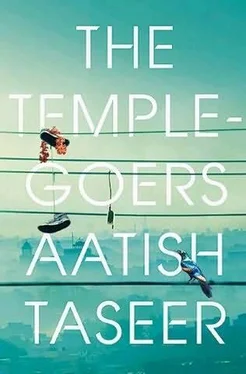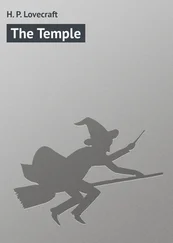The sea changed from green to brown; oily, rainbow patterns ran over its surface. Red-bottomed, rusting freighters, some with Russian and Arab names, came into view. Then tall white buildings and the pale red domes of the Taj Hotel. A terrorist attack had left its façade blackened, its windows boarded up. There was now heavy security outside. Bombay’s mud-coloured water sloshed around us, bringing up plastic bottles and rose petals. A businessman’s yacht prevented us from docking. The passengers on the ferry stared in wonder at its white body, darkened windows and European crew. We rocked in the brown water for a few minutes more, then gingerly disembarked. I was on the three p.m. flight to Delhi.
Uttam was there to pick me up at the other end. There was new weather in Delhi. The winter had dried out, and though the silk cotton’s fleshy flowers were yet to fill with their coral colour, the months of flowering trees yet to come, there was an unruly wind blowing, carrying in its wilfulness, rather than in its temperature, hints of summer. Delhi was my city. I knew its every mood, its every colour; it could only surprise me now on hidden levels when, like a spy agency, it would unseal from some shade-filled crescent, dark as a forest, a new memory.
But I couldn’t think of that Delhi. It was another casualty of the ending romance. And Sanyogita, as if claiming it as part of her settlement, chose to meet in Lodhi Gardens. We came to it now from different directions: I, from the Lutyens’s Delhi end; she, from the Jorbagh end. I had walked there every day when I lived in Delhi. Her suggesting we meet there felt like an appropriation. Trying to gauge the fine meanings in these messages – her new assertiveness, her calm – I became aware before entering the park that our relationship was over.
In the days that followed the night at the safe house, I took my mother up on a long-standing offer to visit her in Alibaug, at my stepfather’s and her house by the sea. I wanted both to be in India but to hold it at bay. I found myself wishing for the oblivion of my childhood, for the inevitability of my surroundings.
I might have stayed indefinitely at that house by the sea, with its dim view of Bombay and its blackened beach, on to which the carcasses of turtles and dolphins occasionally washed up, had Sanyogita, some eight weeks after my arrival, not called. All that had happened over the past year must have clarified for her too. And released from a cycle with me, she decided to be released for good.
She always wore a fig-scented perfume. But not that day. And other small things were different too. She dressed warmly, and for comfort, though it was not cold. Normally she would have worn her light, pretty clothes as soon as it was warm. Her longish black hair was twisted into a single plait and pulled over her left shoulder. Her smile with its tinge of sadness seemed now in sadness to be cheerful. It also had a humorous or ironic colour, as if projecting some fairy-tale notion that this inversion was the greatest sadness of all. It was as if she had dismantled the person she had been before. And it felt both like a defence and a renewal. I thought I saw in her face relief that it was over.
It prevented me from making any kind of case. It felt too much to overturn the serenity of the evening. We met as we’d met many times before; the only difference was that we wouldn’t meet again. It was a small park, but intricate, and we walked many times around it. We walked past the bare tombs with their line of glazed turquoise tiles hanging on over the centuries. There was bougainvillea, the avenue of white-trunked palms and an old bridge of high pointed arches. We stood there over a mossy pond.
Thinking only of her words from the night before, obsessed with them now, I said at last, ‘Is it because of what you said last night, about not being able to compete with the other intimacies in my life?’
‘Not only,’ she replied, ‘not only,’ making me feel that the passion from the night before had gone out of her. ‘My feelings have changed,’ she said again.
‘Overnight?’
‘No, not overnight. Over many months.’
‘Why didn’t you tell me before?’
‘I didn’t want to believe that they had.’
It was so beguiling an answer. I felt our emotional equivalency evaporate.
‘Have you heard from Aakash?’ she asked with no rancour.
‘Come on. I hope this is not about -’
‘No, no, really, no. I’m just curious.’
I could see she was not lying.
After Aakash revealed the secret of Kris’s homosexuality to Chamunda, and Chamunda, with his short story in hand, revealed it to the press, a new motive had arisen for the murder. ‘Brother kills sister,’ the Hindustan Times said, ‘after she discovered he was a gay.’ Another paper wrote, ‘Sister dies for threatening to expose homosexual ring’. Lurid extracts from the story had appeared in all the papers. And though this was not enough to incriminate Kris, it was enough to check the public support that had grown after his arrest. Shabby still fought on, but the energy behind the cause drained away. Aakash, who understood the sensibilities of the newly prying society better than anyone else – knew its values had not caught up with its new degree of self-knowledge – would also have known the contempt such a revelation would arouse in people’s hearts.
‘He always lands on his feet,’ Sanyogita said, smiling. ‘Look what I saw today, driving through Sectorpur.’
She took out a folded piece of paper from her pocket and handed it to me. It was thin, crinkly and glue-stained. I opened it and saw that it was an election poster. On a green background were, as in a family tree, oval-shaped pictures of the party leaders. Chamunda, once again in saffron chiffon, towered in the foreground. And at her feet, a lotus seeming to form a mane round his head, was a picture of Aakash, looking blacker than usual. It made me think of Megha and the little sweeper. ‘Loin! loin! What does a loin do?’ Poor Megha. Her jovial memory seemed so distant now.
‘Did you know he was contesting?’
‘Yes,’ I lied. ‘What as?’
‘Oh, just as an MLA, but still. Chamunda gave him a ticket as repayment for what he did for her.’
‘Didn’t the press hassle her about that, giving a ticket to a man who was almost charged with murder?’
‘Are you joking? It’s virtually a credential.’
We had come to the green turnstile leading out of the park.
‘And Kris?’ I asked.
‘Kris is free,’ Sanyogita replied. ‘The CBI got him out. After Aakash no longer needed him, Sparky Punj became Kris’s lawyer; they were friends anyway. But the case will go on. I doubt they’ll ever find the real guy. It’s easier that way.’
‘But won’t it hurt Chamunda in the election?’
‘It could. And so maybe they will find someone to pin it on.’
Politicians’ white cars were parked outside the garden’s gates. Thin ladies in bright colours carried shallow dishes of cement to and from a mound of mud half-filled with water. Sanyogita, picking her way past a column of men in fraying vests digging up the pavement, walked towards a chauffeur-driven car.
‘Sanyogita?’ I called out.
She turned round.
‘How’s the garden?’
‘Oh!’ she said, stopping herself from saying ‘baby’, ‘it’s fine. Flourishing.’
‘And my study?’
She smiled sadly at me, seeing now where this line of conversation was headed.
‘It’s fine too,’ she said quickly, as if worried I was going to ask next about her toes or the family of porcelain elephants.
Through the tinted window of the chauffer-driven car I could make out the profiles of Ra and Mandira. They had come to pick her up. They saw me and waved, but didn’t get out. Nothing like one’s girlfriend’s friends to bring home the pain of a break-up. Sanyogita turned round once more, smiled apologetically, then got into the car and drove way.
Читать дальше












